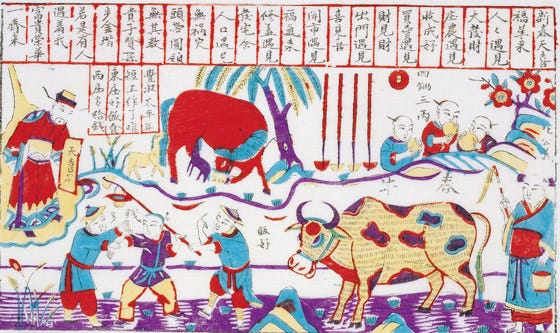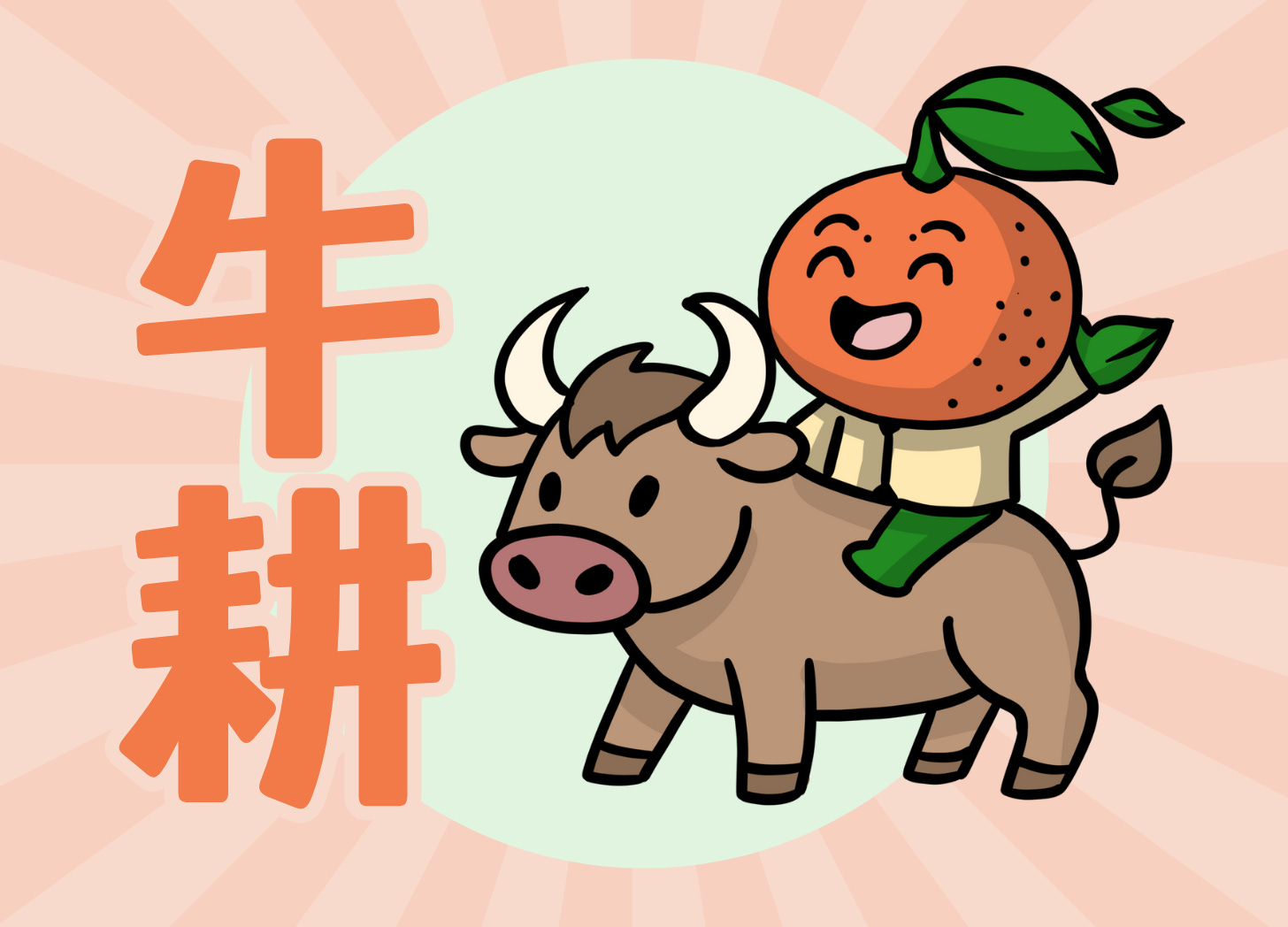Why Don’t Some Chinese People Eat Beef?
An Ox: A Man’s Best Friend🐂
As you may know, Chinese people are generally meat lovers, which isn’t great news for our vegan friends. However, in some agricultural Han cultures, particularly in the Minnan region, there is a taboo against eating beef. This tradition has also been carried by Chinese migrants to places like Malaysia and Taiwan.
Let’s read some articles about why it is the case, and what it has to do with the history of Chinese agriculture.
战国时代牛耕开始逐渐推广到全国之后,牛就成为重要的生产工具。为了促进生产,很多朝代都以法律的形式,禁止宰杀耕牛。
战国时代 (zhàn guó shí dài) – warring states period
牛耕 (niú gēng) – ox plowing
以……形式 (yǐ... xíng shì) – in the form of...
禁止 (jìn zhǐ) – to prohibit
宰杀 (zǎi shā) – to slaughter
耕牛 (gēng niú) – plowing ox
Since the Warring States period, ox-drawn plowing gradually spread throughout China, and oxen became essential tools for agricultural production. In order to promote farming, many dynasties implemented laws prohibiting the slaughter of draft oxen.
例如《汉书·龚遂传》记载:“禁私杀牛马,牛用耕田,有宰食者,杀无赦”。
宰食 (zǎi shí) – to slaughter for food
杀无赦 (shā wú shè) – kill without pardon; capital punishment without mercy
For example, the Book of Han (Han Shu, "Biography of Gong Sui") records:
“It is forbidden to privately kill oxen or horses. Oxen are used for tilling the land. Anyone who slaughters them to eat shall be executed without pardon.”
可见按古代法律,私自屠杀牛已经是杀头的重罪,之后唐、宋、明、清几代虽然对私自杀牛罪的量刑有所降低,但私自屠牛始终是犯法的。直到清末新政时,中国才废除了这项罪名。
按 (àn) – according to; based on
私自 (sī zì) – privately; without authorization
屠杀 (tú shā) – to slaughter; to butcher
杀头 (shā tóu) – execution by beheading
重罪 (zhòng zuì) – serious crime; capital crime
几代 (jǐ dài) – several generations; several dynasties
量刑 (liàng xíng) – sentencing; punishment
有所 (yǒu suǒ) – somewhat; to some extent
始终 (shǐ zhōng) – all along; from beginning to end
犯法 (fàn fǎ) – to break the law; illegal
清末 (Qīng mò) – late Qing dynasty
废除 (fèi chú) – to abolish; to repeal
罪名 (zuì míng) – criminal charge; accusation
From these records, it's evident that in ancient Chinese law, privately slaughtering an ox was a capital offense. Although later dynasties such as the Tang, Song, Ming, and Qing reduced the severity of the punishment, unauthorized killing of oxen remained illegal. It wasn't until the late Qing dynasty’s New Policies reforms that this law was finally abolished.
道教正一派有一些特别的饮食禁忌,其中最著名的就是「四不吃」。这些禁忌不仅仅是饮食习惯,更是对道德和自然的尊重, 包含: 不吃牛肉。牛一生都在辛勤工作,对人类贡献巨大,象征着忠诚。所以,道教正一派认为,不吃牛肉是一种对牛的尊重和对忠诚的追求。
正一派 (zhèng yī pài) — Zhengyi sect (a branch of Taoism)
四不吃 (sì bù chī) — “four don’t-eats” (the four foods not to be eaten)
不仅仅 (bù jǐn jǐn) — not only
辛勤 (xīn qín) — hardworking, diligent
贡献 (gòng xiàn) — contribution, to contribute
象征 (xiàng zhēng) — symbolize, symbol
忠诚 (zhōng chéng) — loyalty, faithful
追求 (zhuī qiú) — to pursue, pursuit
The Zhengyi school of Taoism has certain unique dietary taboos, the most well-known of which is the "Four No-Eats." These taboos are not merely dietary habits but reflect a deep respect for morality and nature. Among them is the prohibition against eating beef. Cattle work tirelessly throughout their lives and contribute greatly to humanity, symbolizing loyalty. Therefore, the Zhengyi school believes that refraining from eating beef is a way to honor the ox and uphold the value of loyalty.

中国闽南师范大学“闽江学者”讲座教授王琛发博士接受《东方日报》访问时指出,大致上,大马华人不食牛肉的观念是受到多项因素的影响。
他说,在中国古代,牛是农民非常重要的耕田工具,因其终年劳苦,养活大众,所以人们都不忍心杀食。
闽南 (mǐn nán) — Minnan (Southern Fujian region)
闽江学者 (mǐn jiāng xué zhě) — Minjiang Scholar (a prestigious academic title)
讲座教授 (jiǎng zuò jiào shòu) — chair professor
大致上 (dà zhì shàng) — roughly, generally
大马 (dà mǎ) — Malaysia (short for 马来西亚)
多项 (duō xiàng) — many, multiple (items/factors)
因素 (yīn sù) — factor
因其 (yīn qí) — because of its
终年 (zhōng nián) — all year round
劳苦 (láo kǔ) — hardworking, laborious
养活 (yǎng huó) — to support, to feed
不忍心 (bù rěn xīn) — cannot bear to, reluctant to
杀食 (shā shí) — to kill and eat (food)
Dr. Wang Chenfa, a "Minjiang Scholar" Chair Professor at Minnan Normal University in China, pointed out in an interview with Oriental Daily that the general concept among Malaysian Chinese of not eating beef is influenced by multiple factors.
He explained that in ancient China, the ox was an extremely important tool for farmers in plowing fields. Because of its tireless labor throughout the year and its role in sustaining the population, people were reluctant to kill or eat it.
“尤其在中国华南地区如广东、广西、海南及福建等,牛能负重川行于山路,也能背运货品上船,加上牛性又比马性沉稳,被视为重要的运输工具。”
华南地区 (huá nán dì qū) — South China region
负重 (fù zhòng) — carry heavy loads
川行 (chuān xíng) — travel through rivers and mountain paths (川 means river or mountainous region, 行 means travel)
背运 (bēi yùn) — carry (on back) and transport
沉稳 (chén wěn) — steady, calm, dependable
被视为 (bèi shì wéi) — be regarded as
运输工具 (yùn shū gōng jù) — means of transportation
"Especially in southern China—regions such as Guangdong, Guangxi, Hainan, and Fujian—the ox was capable of carrying heavy loads through mountainous terrain and transporting goods onto boats. Moreover, oxen were seen as more stable in temperament than horses, making them valuable transportation tools."
他说,人与牛的配合还展现在“春牛图”,而中国古时农业社会,人民就是靠“春牛图”来预知当年廿四节气变化。
预知 (yù zhī) — to predict, to foresee
廿四节气 (niàn sì jié qì) — the 24 solar terms (traditional Chinese time system for agricultural seasons)
He also noted that the cooperation between humans and oxen was symbolically represented in the "Spring Ox Picture" (Chunniutu), which in ancient agricultural society was used to predict the weather and the 24 solar terms of the year.

Have any of your Chinese, Malaysian Chinese, or Taiwanese friends ever refused to eat beef? Now you know why!
Thank you for reading Mandarin Zest. We love to read Chinese with you and want to continue in the future. Please consider pledging to help us write the weekly posts and more! Any pledge, montly or yearly, would be very helpful. 谢谢
Antoine & Dorota
Referenced authors: orientdaily, Sohu, 品热饮偏爱温火男壮壮








